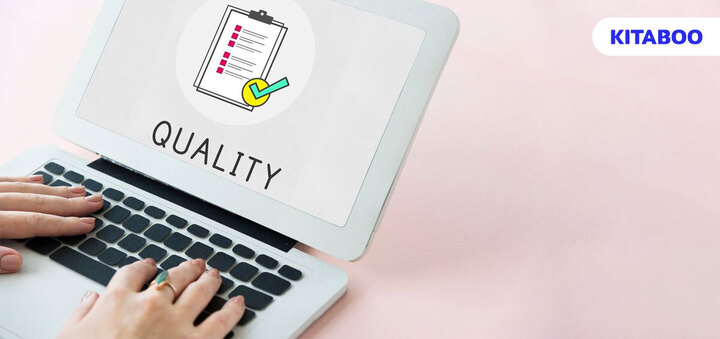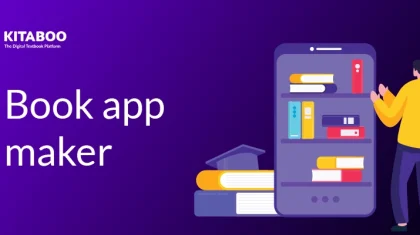
Quality Assurance in Education: Editorial Oversight and Beyond
Summarize this blog with your favorite AI:
Quality assurance in education serves as a crucial foundation, ensuring the delivery of impactful learning experiences for students. While most people associate quality assurance with editorial oversight, it goes beyond just that.
Ensuring top-notch education is like crafting a masterpiece; it’s more than just fixing a few typos. It’s a comprehensive process that ensures students receive a rich experience while learning.
Quality assurance isn’t just about checking boxes; it’s about helping our educators grow, ensuring students receive quality learning, and getting families and communities in on the process. By weaving all these elements together, our schools become hubs of amazing learning experiences.
Enter KITABOO – your gateway to a revolution in education, a state-of-the-art cloud-based digital textbook platform that enhances the quality assurance process by providing interactive and engaging educational content.
With the help of digital textbook platforms like KITABOO, we’re looking ahead, excited about using state rules, making smart decisions with data, and teaming up with cool technology to crank up the volume of education. It’s all about getting our students ready to conquer the ever-changing world with a smile.
Table of Contents:
I. The Importance of Quality Assurance in Education
II. Editorial Oversight: The Foundation of Educational Quality Assurance
- State-Aligned Curriculum Assurance
- Rigorous Content Review and Enhancement
- Expert Input and Guidance
- Stringent Quality Control Measures
- Expanding the Horizon of Quality Assurance
- Continuous Professional Development for Teachers
- Holistic Assessment of Student Learning
- Collaboration with Parents and the Community
- Strategic Resource Allocation
The Importance of Quality Assurance in Education
Quality assurance in education is crucial for guaranteeing that students engage in a high-caliber and effective learning journey. It goes beyond content delivery, focusing on the continuous enhancement of the overall educational standard.
Here are reasons why quality assurance in education is paramount.
Ensuring State-Aligned Curriculum
Aligning the curriculum with state standards is fundamental for quality assurance. This alignment ensures that students acquire the necessary knowledge and skills. These skills are mandated by the state education department, which helps you establish a standardized framework in education.
Identifying Areas of Improvement
Quality assurance serves as a guide, pinpointing areas for improvement. Through systematic evaluation, educational institutions identify strengths and weaknesses in teaching methodologies, resources, and infrastructure. This proactive approach facilitates targeted interventions, leading to enhancements that directly benefit students.
Building Trust and Credibility
Quality assurance also plays a crucial role in building trust and credibility. A positive perception of an educational institution, fostered by confidence from parents, students, and society, leads to increased enrollment, stakeholder support, and overall success.
Editorial Oversight: The Foundation of Educational Quality Assurance
The effectiveness of quality assurance in education heavily relies on editorial oversight, acting as a cornerstone in delivering top-tier learning experiences. Editorial oversight contributes significantly to maintaining educational quality through various mechanisms.
In this area, textbook creation platforms like KITABOO prove to be highly useful as they play a pivotal role in enhancing editorial processes and ensuring that educational content meets the highest standards of quality.
State-Aligned Curriculum Assurance
Editorial oversight ensures curriculum alignment with state standards, guaranteeing that students receive the necessary knowledge and skills prescribed by the state education department. This promotes consistency and equity in education.
Rigorous Content Review and Enhancement
Editorial oversight involves rigorous reviews and enhancements of educational materials for accuracy, relevance, and quality. Thorough content reviews identify and rectify errors and inconsistencies, elevating the overall standard of education.
Expert Input and Guidance
Subject matter experts play a pivotal role in editorial oversight, offering input and guidance to enhance educational content. Their expertise ensures materials remain accurate, up-to-date, and aligned with field best practices.
Stringent Quality Control Measures
Editorial oversight implements stringent quality control measures, checking for grammatical errors, formatting consistency, and adherence to style guidelines. Ethical standards are upheld by reviewing content for biases, stereotypes, or misinformation, ensuring inclusivity, diversity, and respect for all learners.
In this commitment to excellence, innovative platforms like KITABOO‘s cloud-based digital textbook platform become instrumental. Incorporating editorial oversight into quality assurance practices ensures that materials and resources meet elevated standards, fostering improved learning outcomes and a superior educational experience for all students.
Expanding the Horizon of Quality Assurance
Beyond editorial oversight, quality assurance in education encompasses critical facets extending beyond content scrutiny. Delving into these aspects ensures a comprehensive approach to delivering high-quality education.
Continuous Professional Development for Teachers
Prioritizing teachers’ professional development is paramount. Continuous training through workshops, seminars, and conferences equips teachers with evolving teaching strategies and techniques, ensuring an optimal learning experience for students.
Holistic Assessment of Student Learning
A crucial component of quality assurance is the comprehensive assessment of student learning. Employing diverse assessment methods provides a nuanced understanding of student progress, facilitating necessary adjustments in teaching approaches to meet standards.
Collaboration with Parents and the Community
Involving parents and the community in quality assurance efforts is indispensable. Open communication and partnerships with community organizations create a collaborative educational approach, incorporating valuable insights and feedback on policies, practices, and curricula.
Strategic Resource Allocation
Effective resource allocation is pivotal for quality assurance. Access to ample funding, technology, materials, and facilities creates an optimal learning environment. Accommodations for students with special needs ensure equal educational opportunities.
Innovative Approaches to Improve Education Quality
In the ever-changing world of education, ensuring quality takes center stage. Institutions are urged to adopt creative methods for a meaningful learning experience.
In this exploration of creative methods, KITABOO emerges as a valuable tool for institutions seeking to elevate the quality of education in an ever-evolving educational landscape. This article explores some exciting ways to enhance education quality, making learning more impactful.
Making Education Relevant with State-Aligned Curriculum
Ensuring education aligns with state standards is crucial. This guarantees students get an education that matches the state’s goals. Creating a curriculum that blends state-specific learning goals, benchmarks, and assessments is vital.
This not only ensures students learn what the state requires but also prepares them well for state tests. An aligned curriculum brings fairness to education, benefiting all students.
Smart Teaching with Data-Driven Decisions
A forward-thinking method is using data to guide decisions. By carefully collecting and studying student performance data, schools can find areas for improvement and offer personalized help. Today’s K–12 education must prioritize data-driven decision making.
For example, teachers can adjust lesson plans based on student needs, helping struggling students and challenging high-performing ones. This approach becomes a powerful tool for enhancing education quality.
Embracing Technology for Better Learning
Technology has transformed education, offering new ways to ensure quality. Digital tools let educators monitor and assess students in real time, providing timely feedback.
Online resources complement classroom learning, creating a flexible and engaging environment. Technology also enables distance learning, opening up new possibilities. Using digital tools ensures high-quality and innovative learning experiences.
Fostering Teamwork in Learning Environments
Collaborative learning environments allow students to learn from each other, share ideas, and build social skills. This approach encourages group work on projects, presentations, and assignments, creating a trusting and respectful atmosphere.
By embracing collaborative learning, schools prepare students for the teamwork needed in the modern workplace, equipping them with essential skills for life.
The Future of Quality Education
Looking ahead, exciting developments promise to enhance learning experiences. Technology, with advancements in artificial intelligence and machine learning, will analyze student performance data to offer personalized help. By 2027, the market for AI education is expected to grow to $20 billion. In this landscape, platforms like KITABOO stand out as catalysts for educational innovation.
Another focus is bringing real-world experiences into the curriculum. Recognizing the importance of preparing for the workforce, institutions will provide opportunities for applying knowledge in real-world contexts through internships, apprenticeships, or partnerships with local businesses.
The Takeaway
The future of education quality holds great promise. By integrating technology, focusing on practical experiences, and promoting collaboration, we can ensure students receive a high-quality and effective education, preparing them for success.
Embracing these advancements and working together creates a bright future for education, unlocking the full potential of our students.
Innovative platforms like KITABOO, a state-of-the-art cloud-based digital textbook platform, play a crucial role in this transformative journey by providing dynamic and interactive learning experiences for students, further enriching the educational landscape.
Write to us at contact@web-staging.kitaboo.com for more info.
Also Check:
Discover how a mobile-first training platform can help your organization.
KITABOO is a cloud-based platform to create, deliver & track mobile-first interactive training content.



